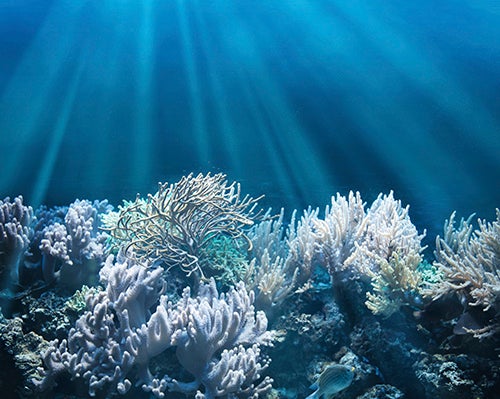
Waterloo discovery: Tiny ocean organisms are big B12 producers
Research has climate change implications because B12 controls production of the organisms that remove carbon dioxide from the environment

Research has climate change implications because B12 controls production of the organisms that remove carbon dioxide from the environment
By Victoria Van Cappellen Faculty of ScienceTwo biologists have shown that Thaumarchaeota, a group of microorganisms that has never been associated with vitamin B12 before, may actually be responsible for much of the world’s B12 production in the oceans.
Andrew Doxey and Josh Neufeld, professors in Waterloo’s Department of Biology, point out that the discovery has implications for climate change because the availability of vitamin B12 may control how much or how little biological productivity by phytoplankton takes place in the oceans. Phytoplankton remove carbon dioxide from the atmosphere much like plants and trees.

Among the most abundant organisms on the planet
"Because Thaumarchaeota are among the most abundant organisms on the planet, especially in marine environments, their contribution to vitamin B12 production have enormous implications for ecology and metabolism in the oceans," said Neufeld.
Although vitamin B12 is an essential molecule required by most life on this planet, it is only produced by a relatively small group of microorganisms because it is so large and complex. For humans, vitamin B12 plays a key role in maintaining the brain and nervous systems, as well as DNA synthesis in cells throughout the body.
Doxey and Neufeld’s research on Thaumarchaeota, a group of microorganisms from the Archea domain, was published online recently in the International Society for Microbial Ecology (ISME) Journal.
"We assumed that most major sources of something as fundamental as vitamin B12 would have already been characterized, and so this finding changes how we think about global production of this important vitamin," said Doxey.
Scientists searched vast amounts of DNA
The researchers used computational methods to search through vast amounts of sequenced environmental DNA for the genes that make vitamin B12, identifying the likely producers in aquatic environments.
The research also found that proportions of archaeal B12 synthesis genes increased with ocean depth and were more prevalent in winter and polar waters, suggesting that archaeal vitamin B12 may be critical for the survival of other species in both the deep and cold marine environments.
The Natural Sciences and Engineering Research Council of Canada (NSERC) funded the research.

The photo shows a European bat species affected by White-nose Syndrome.
Read more
Study highlights the biological mechanisms behind a disease that has caused over 90 per cent declines in some bat species

Read more
The Government of Canada announces funding to support research in food policies and medical devices

New research examines the carbon-removal potential of strategic planting (Getty Images/Zhao Qin).
Read more
AI-powered modelling shows planting in northern forests could help Canada become carbon neutral by mid-century
The University of Waterloo acknowledges that much of our work takes place on the traditional territory of the Neutral, Anishinaabeg, and Haudenosaunee peoples. Our main campus is situated on the Haldimand Tract, the land granted to the Six Nations that includes six miles on each side of the Grand River. Our active work toward reconciliation takes place across our campuses through research, learning, teaching, and community building, and is co-ordinated within the Office of Indigenous Relations.